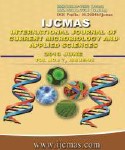


 National Academy of Agricultural Sciences (NAAS)
National Academy of Agricultural Sciences (NAAS)

|
PRINT ISSN : 2319-7692
Online ISSN : 2319-7706 Issues : 12 per year Publisher : Excellent Publishers Email : editorijcmas@gmail.com / submit@ijcmas.com Editor-in-chief: Dr.M.Prakash Index Copernicus ICV 2018: 95.39 NAAS RATING 2020: 5.38 |
Wheat genotypes were shown under restricted irrigated condition, based on morphological traits and their genetic variability, correlation coefficient analysis, path coefficient analysis and rank germplasm based on principal component analysis for yield and yield attributing traits. This investigation was carried out with 30 genotypes of wheat using 17 traits viz., days to 50% flowering, days to maturity, plant height, number of effective tillers per plant, number of ears per plant, number of spikelets per spike, ear length, ear weight, peduncle length, number of grains per ear, 1000-grain weight, grain yield per plant, biological yield per plant, harvest index, relative water content, chlorophyll content and canopy temperature. The high heritability coupled with high genetic advance as percentage of mean was recorded for ear weight, harvest index, biological yield, number of ears per plant, grain yield, number of effective tillers per plant, peduncle length, number of grains per ear, ear length, number of spikelets per spike, total grain weight and canopy temperature. The high heritability coupled with moderate genetic advance was recorded for chlorophyll content and relative water content whereas, high heritability coupled with low genetic advance was observed for plant height, days to 50% heading and days to maturity. On the basis of correlation and path studies of the present investigation, most important traits identified among the promising genotypes of wheat were biological yield, number of ears per plant and harvest index. On the basis of principal component analysis 5 principal components (PCs) showed about 68.05% variability and germplasm viz., PYT-61, PYT-101, PYT-22, PYT-49, PYT-40, PYT-16, PYT-97, PYT-51, PYT-115 and PYT-27 had been identified as promising genotypes as they posses higher values for yield and yield attributing traits.
 |
 |
 |
 |
 |